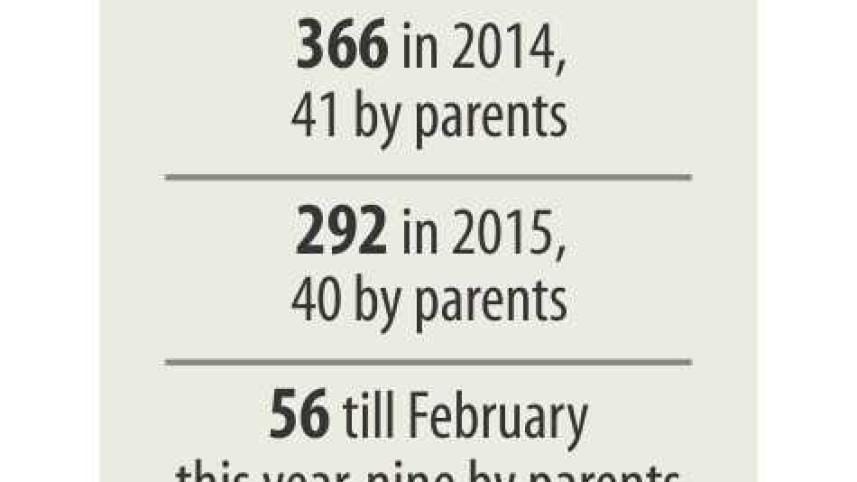Why such cruelty against children?

Weakening familial bonds and poor social interactions could be the main reasons for the spike in violence and cruelty against children, even within the supposedly safe protection of their homes.
Psychologists, sociologists and child rights activists came up with the view yesterday while talking about the recent spate of violence against children including murders committed by parents.
Some 56 children were killed across the country in the last two months. 29 of them were killed in January while 27 in February. Nine of the 56 children were killed either by their biological parents or by step-parents, according to Bangladesh Shishu Adhikhar Forum (BSAF) data.
Also, 40 of the 292 children killed last year and 41 of 366 victims in 2014 were murdered by their parents.
These incidents have raised questions over the state of society, especially so following the alleged murder of two siblings by their mother in the capital's Banasree on Monday, a newborn being thrown from the fourth-floor of a building by its teenage mother in Dhaka on February 1, and a woman hacking her five-month-old daughter to death in Mymensingh on December 29 last year.
"The interpersonal relations between parents and children are deteriorating," says BSAF Chairperson Md Emranul Huq Chowdhury. "We have become more individualists."
People are having problems in keeping pace with the consumerism-based economic growth in which earning more and more money is the main focus. This results in the deterioration of social values and responsibilities, he says.
"It is creating restlessness among us and damaging our social relations."
Children are often becoming victims of these imbalanced changes in the society, Emranul adds.
Mohit Kamal, head of psychotherapy at National Institute of Mental Health, believes social surroundings and television programmes too have a part in these negative changes.
"Thanks to wealth shown on television shows or the economic status of the next-door neighbours, people often find their financial reality failing to meet their unrealistic expectations. This ultimately leads them to depression."
Citing the National Survey on Mental health 2006, he says 4.6 percent of the country's people were depressed. "The number must have increased by now."
The depressed people tend to think negatively and, after a certain period of time, all of their decisions and thoughts get affected by the depression, often resulting in violent outburst, he adds.
Prof Mehtab Khanam of Educational and Counselling Psychology at Dhaka University says unhappy conjugal life often leads to depression and the children in many cases fall victim to their parents' mental stress.
"Neither the state nor the society gives much importance to the mental health issue," she says, stressing the need for preventive measures to tackle such problems.
Nehal Karim, a professor of sociology at the same university, thinks certain TV programmes should be blamed for the spread of violence in the society.
"It seems all we watch on TV are quarrels and fights within families. Unfortunately, such programmes are popular among the audience."
While it may not be possible to change these things with laws, different institutions, especially the government agencies concerned, should try to promote positive changes, he adds.
Children are always in a vulnerable situation in the society because of their age, observes Laila Khondokar, director of Child Protection of Save the Children.
"Physically they are weaker than the adults and are dependent on them ... You would think twice before hitting an adult but you can get away with doing that to a child."
Parents often vent the stress they face at work or in everyday life on their children, which is not right, she says.
"The main problem is that we often see the children as our property, not as human beings," Laila adds.
 For all latest news, follow The Daily Star's Google News channel.
For all latest news, follow The Daily Star's Google News channel.
Comments